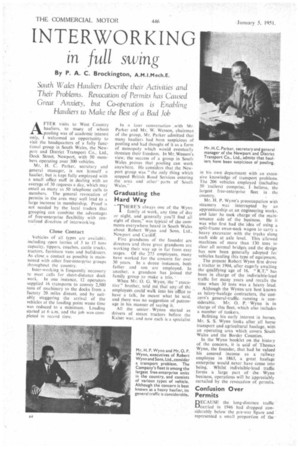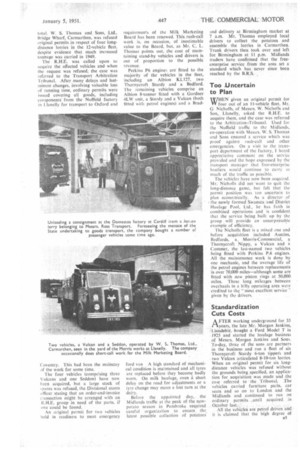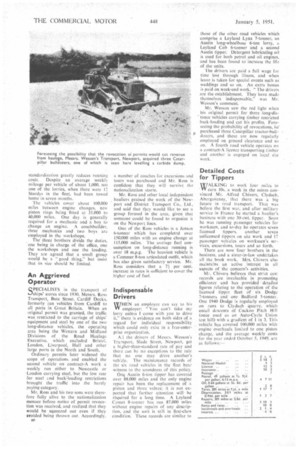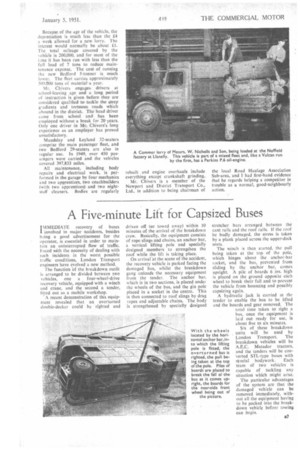INTERWORKING
Page 38

Page 39

Page 40

Page 41

If you've noticed an error in this article please click here to report it so we can fix it.
in full swing By P. A. C. Brockington, A.M.I.Mech.E.
South Wales Hauliers Describe their Activities and • Their Problems. Revocation of Permits has Caused Great Anxiety, but Co-operation is Enabling Hauliers to Make the Best of a Bad Job AFTER visits to West Country hauliers, to many of whom pooling was of academic interest only, I welcomed an opportunity to visit the headquarters of a fully functional group in South Wales, the Newport and District Transport Co., Ltd., Dock Street, Newport, with 50 members operating over 300 vehicles.
Mr. H. C. Parker, secretary and general manager, is not himself a haulier. but is kept fully employed with a small office staff in dealing with an average of 30 requests a day, which may entail as many as 50 telephone calls to members. The general revocation of permits in the area may well lead to a large increase in membership. Proof !s not needed by the local traders tha; grouping can combine the advantages of free-enterprise flexibility with centralized direction of interworking.
Close Contact
Vehicles of all types are availabk. including open lorries of 3 to 15 tons capacity, tippers, coaches, cattle trucks, tractors, furniture vans and bulldozers. As close a contact as possible is maintained with other free-entertrise groups throughout the country.
Inter-working is frequently necessary to meet calls for short-distance dock work. In one instance. 12 operators supplied 16 transports to convey 2,500 tons of machinery to the docks from a factory 20. miles distant, and by suitably staggering the arrival of the vehicles at the loading point waste time was reduced to a minimum. Loading started at 6 a.m. and the job was completed in record time.
In a later conversation .with Mr Parker and Mr. W. Wesson, chairman of the group, Mr. Parker admitted that many hauliers had been suspicious of pooling and had thought of it as a form of monopoly which would eventually threaten their freedom. In Mr. Wesson's view, the success of a group in South Wales . proves that pooling can work anywhere. He considers that the Newport group was "the only thing which stopped British Road Services entering the area and othei parts of South
Graduating the Hard Way THERE'S always one of the Wynn family at work, any time of day or night, and generally you'll find all eight of them," was typical of the comments everywhere heard in South Wales about Robert Wynn and Sons. Ltd., Newport and Cardiff.
Five grandsons of the founder are directors and three great grandsons are working their way up in far from easy stages. Of the 273 employees, many have worked for the concern for over 30 years. In a dozen instances, both father and son are employed. In another, a grandson has joined the family group to make a trio. !
When Mr. 0. G. Wynn, the " executive " brother, told me that any-of the employees could walk into his office to have a talk, he meant what he said, and there was no suggestion of patronage in his manner of saying it.
All the senior. Wynns started as drivers of steam tractors before the Kaiser war, and now each is a specialist in his own department with an extensive knowledge of transport problems. The 206 vehicles employed (including 50 'trailers) comprise, I believe, the largest free-enterprise fleet in the country.
Mr. H. P. Wynn's preoccupation with steamers was interrupted by an apprenticeship at an engineering works, and later he took charge of the maintenance side of the business. He it was who first had the idea of using a split-frame swan-neck wagon to carry a heavy excavator with the tracks slung each side at axle level. This allowed machines of more than 130 tons to clear all normal bridges and the design has now been generally adopted for vehicles hauling this type of equipment.
The present Robert Wynn first drove a tractor in 1904, after eagerly awaiting the qiialifying age of 16. " RT." has been in charge of the indivisible-load traffic for many years and recalls the time when 30 tons was a heavy, load.
Although the Wynns are best known as heavy-haulage contractors, the coricern's general-traffic running is con siderable. Mr. 0. P. Wynn is in charge of this fleet, which also includes a number of tankers.
Befitting his early interest in horses. Mr. S. S. Wynn 'looks after all horse transport and agricultural haulage, with an operating area which covers South Wales and the Border Counties.
In the Wynn booklet on the history of the concern, it is said of Thomas Wynn, the founder, that had he valued his assured income as a railway employee in 1863, a great haulage enterprise would never have come into being. Whilst indivisible-load traffic forms a large part of the Wynn business, operations will be appreciably curtailed by the revocation of permits.
Confusion Over Permits BECAUSE the long-distance traffic carried in 1946 had dropped considerably below the pre-war figure and ' represented a small proportion of the
total, W. S. Thomas and Sons, :Ltd., Bridge Wharf, Carmarthen, was refused original permits in respect of four longdistance lorries in the 12-vehicle fleet, despite evidence that much increased tonnage was carried in 1949.
The R.H.E. was called upon to acquire the affected vehicles and when the request was refused, the case was referred to the Transport ArbitratiOn Tribunal. After many delays and lastminute changes, involving valuable loss of running time, ordinary permits were issued covering all goods, including components from the Nuffield factory in LlarteIly for transport to Oxford and
Coventry. This had been the mainstay of the work for some time.
The four vehicles (comprising three Vulcans and one Seddon) have now been acquired, but a large stock of -pares was refused, the Divisional stores officer stating that an order-and-invoice transaction might be arranged with an R,H.E. group in need of the parts, if one could be found.
An original permit for two vehicles held in readiness to meet emergency requirements of the Milk Marketing Board has been renewed. This.rush-call work is, on occasion, of inestimable value to the Board, hut, as Mr. C. L. Thomas points out, the cost of maintaining stand-by vehicles and drivers is out of proportion to the possible revenue.
Perkins P6 engines are fitted to the majority of the vehicles in the fleet, including an Albion KL127, two Thornycroft Sturdy and a Bedford. The remaining vehicles comprise an Albion 8-tonner fitted with a Gardner 4LW unit. a Sturdy and a Vulcan (both fitted with petrol engines) and a Brad ford van A high standard of mechanical condition is maintained and all tyres are replaced before they become badly worn. On milk haulage, even a short delay on the road for adjustments or a tyre change may mean a lost turn at the dairy.
Before the appointed day, the Midlands traffic at the peak of the newpotato season in Pembroke required careful organization to ensure the latest possible collection of potatoes
and delivery at Birmingham market at 7 a.m. Mr. Thomas employed local drivers to collect the potatoes and assemble the lorries in Carmarthen. Trunk drivers then took over and left for Birmingham at 11 p.m. Midlands traders have confirmed that the freeenterprise service from the area set a standard which has never since been reached by the B.R.S.
Too Uncertain to Plan
WHEN given an original permit for VV four out of an 11-vehicle fleet, Mr. G Nicholls, of Messrs. W. Nicholls and Son, Llanelly, asked the R.H.E. to acquire them, and the case was referred to the ArbitrationsTribunal. Used for the Nuffield traffic to the Midlands, co-operation with Messrs. W. S. Thomas and Sons ensured a service which was proof against rush-call and other emergencies. On a visit to the transport department of the factory, I heard appreciative comment on the service provided and the hope expressed by the transport manager that free-enterprise hauliers would continue to carry as much of the traffic as possible.
The vehicles have now been acquired. Mr. Nicholls did not* want to quit the long-distance game, but felt that the permit position was too uncertain to plan econo:nically. As a director of the newly formed Swansea and District Haulage Pool, Ltd., he has faith in combined operations and is confident that the service being built up by the group will provide an unsurpassab.ie example of efficiency.
The Nicholls fleet is a mixed one and before acquisition included Austins, Bed fords, a, Morris-Commercial, a Thornycroft Nippy, a Vulcan and a Commer, the last-named two vehicles being fitted with Perkins P.6 engines. All the maintenance work is done by onc mechanic, and the average life of the petrol engines between replacements -is over 70,000 miles—although some are fitted with new piston rings at 50,000 miles. These long mileages between overhauls in a hilly operating area were credited to the " most excellent service given by the drivers.
Standardization Cuts Costs AFTER working underground for 35 years, the late Mr. Morgan Jenkins, ,Llandebie, bought a Ford Model T in 1925 and started the haulage business of Messrs. Morgan Jenkins and Sons. To-day, three of the sons are partners in the business and run a fleet of six Thornycroft Sturdy 6-ton tipper s and two Vulcan articulated 8-10-ton lorries. When an original permit for six longdistance vehicles was refused without the grounds being specified, an application for acquisition was made and the case referred to the Tribunal. The vehicles carried furniture parts, car seats and so on to London and the Midlands and continued to run on ordinary permits .until acquired in
October last. ' . • All the vehicles are petrol driven and • it is claimed that the high degree of standardization greatly reduces running costs. Despite an average weekly mileage per vehicle of about 1,000, not one of the lorries, when there were 12 Sturdys in the fleet, had been towed home in seven months.
The vehicles cover about 100.000 miles between engine changes, new piston rings being fitted at 35.000 to 40.000 miles. One day is generally required for a mechanic and a boy to change an engine. A coachbuilder. three mechanics and two boys are employed in the workshops.
The three brothers divide the duties. one being in charge of the office, one the workshops and one . the loading. They are agreed that a small group would be a "good thing," but insist that its size should he limited.
An Aggrieved Operator SPECIAL1STS in the transport of ships' stores since 1930. Messrs. Ross Transport, Bute Street, Cardiff Docks. formerly ran vehicles from Cardiff to all ports in Great Britain. When an original permit was granted, the traffic was restricted to the carriage of ships' equipment and steel by one of the two long-distance vehicles, the operating area being the Western and Midland Divisions of the Road Haulage Executive, which excluded Bristol, London, Liverpool. Hull and other large ports in the North and South.
Ordinary permits later widened the scope of operations and enabled the second vehicle on contract-A work a weekly run either to Newcastle or • London carrying steel, but the low rate for steel ind back-loading restrictions brought the traffic into the barely paying category.
Mr. Ross and his two sons were therefore fully alive to the nationalization menace before notice of permit revocation was received, and realized that they would be squeezed out even if they avoided being thrown out. Accordingly. a number of coaches for excursions and tours was purchased and Mr. Ross is confident that they will survive the nationalization storm.
Mr. Ross and other local independent hauliers praised the work of the Newport and District Transport Co., Ltd.. and said that they would like to see a group formed in the arca, given that someone could be found to organize it on the Newport lines.
One of the Ross vehicles is a Jenson 6-tonner which has completed over 150,000 miles with an engine change at 115,000 miles. 1 he average fuel consumption on long-distance running is over 18 m.p.g. The heaviest vehicle is a Commer 8-ton articulated outfit, which has also given satisfactory service. Mr. Ross considers that a 7.1.. per cent. increase in rates is sufficient to cover the higher cost of fuel.
Indispensable Drivers
WHEN an employee can say to his VV employer: "You can't take my lorry unless I come with you to drive it," there is evidence on both sides of a regard for individual responsibility which could only exist in a free-enterprise organization.
Al the drivers of Messrs. Wesson's Transport, Slade Street, Newport, get a hi zher-than-standard rate of pay and there can be no exceptions to the rule that no one may drive another's vehicle. The maintenance records of the six road vehicles in the fleet bear witness to the soundness of this policy.
Onc Austin 6-ton tipper has covered over 88.000 miles and the only engine repair has been the replacement of a piston and three valves: it is not expected that further attention will he r&tuired for a long time. A Leyland Cornet 8-tonner has run 87.000 miles without engine repairs of any description, and the unit is still in first-class condition. These records Are similar to those of the other road vehicles which comprise a Leyland Lynx 7-tonner, an Austin long-wheelbase 6-ton lorry. a Leyland Cub 6-tonner and a second Austin tipper. Detergent lubricating oil is used for both petrol and oil engines, and has been found to increase the life of the units.
The drivers are paid a full wage for time lost through illness, and when leave is taken for special events such as weddings and so on. An extra bonus is paid on week-end work. "The drivers are the establishment. They have made themselves indispensable," was Mr. Wesson's comment.
Mr. Wesson saw the red light when his original permit for three long-dis _ tance vehicles carrying timber restricted back-loading and cut his profits. Foreseeing the probability of revocations, he" purchased three Caterpillar tractor-bulidozers, and these are now regularly employed on ground clearance and so on. A fourth road vehicle operates on a contract-A licence transporting timber and another is engaged on local site work.
Detailed Costs for Tippers WALK1NG to work four miles to earn 10s, a week in the mines convinced .Mr. Alfred Chivers, Clydach. Ahergavcany, that there was a big future in road transport. That was before the first war, and after military service in France he started a haulier's business with one 30-cwt. tipper. Soon he was running passenger vehicles for workmen, and to-day he operates seven licensed tippers. another seven unlicensed tippers on site work and 17 passenger vehicles on workmen's services, excursions, tours and so forth.
There are now four brothers in the business, and a sister-in-law undertakes all the book work. Mrs. Chivers also maintains an active interest in all aspects of the concern's activities.
Mr. Chivers believes that strict cos: records are invaluable in promoting efficiency and has provided detailed figures relating to the operation of the licensed tipper fleet of six Dodge 7-tormers and one Bedford 5-tonner. One 1940 Dodge is regularly employed on runs to Clydach quarry, which entail &smuts of Cuckoo Pitch Hill (onee used as an Auto-Cycle Union test hill) with a gradient of 1 in 3. This vehicle has covered 100.000 miles with engine overhaulslimited to one piston change, and the average weekly costs for the year ended October 5, 1949, are as follows:—
Becanse of the age of the vehicle, the depreciation is much less than the £4 a week allowed for a new lorry. The interest would normally be about £1. The total mileage covered by the chicle is 200,000, and for most of the unte it has been run with less than the full load of 7 tons to reduce maintenance expense. The cost of running the new Bedford 5-tonner is much lower. The fleet carries approximately 500.000 tons of material a year.
Mr. Chivers engages drivers at school-leaving age and a long period of instruction is given before they are considered qualified to tackle the steep gradients and tortuous roads which abound in the district. The head driver came from school and has been employed without a break for 20 years. Only one driver in Mr. Chivers's long experience as an employer has proved unsatisfactory.
Maudslay and Leyland 32-seaters :omprise the main passenger fleet, and two Bedford 29-seaters are also in regular use. In 1949, over 450 passengers were carried and the vehicles covered 397,833 miles.
All maintenance, including body repairs and electrical work, is performed in the garage by four mechanics and two apprentices, two coachbuilders (with two apprentices) and two nightstaff cleaners. Bodies are regularly rebuilt and engine overhauls include everything except crankshaft grinding..
Mr. Chivers is a member of the Newport and District Transport Co., Ltd., in addition to being chairman of the local Road Haulage Association Sub-area, and I had first-hand evidence that he regards helping a competitor in trouble as a normal, good-neighbourly action.




















































































